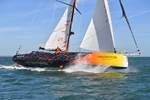Breton companies launch recyclable hydrofoil design project
Development and testing of recyclable, thermoplastic composite hydrofoil structures in Foil Infinity are expected to equip offshore racing yachts by 2030 and potentially even aircraft in the future.
A recyclable hydrofoil is tested on the laboratory boat of the MiniLab project. Source | Foil infinity
Originally reported by news agency API (The API Ouest Agency – France Entreprises), French companies Avel Robotics (Lorient), ComposiTIC (Ploemeur) and Mer Concept (Brittany) have launched the Foil Infinity project to design recyclable hydrofoils made of thermoplastic composites. The goal is to equip offshore racing yachts by 2030.
Each partner is bringing its composites expertise to the project. Avel Robotics is a manufacturer of composite parts for the nautical and aeronautical industries (read CW’s 2022 plant tour). ComposiTIC is a technical from the Université Bretagne-Sud, specializing in the design of materials and automated processes based on robotized fiber placement technology and 3D printing. MerConcept is a French designer and builder of boats for ocean racing.
“The goal is to improve the environmental impact of hydrofoils by using thermoplastics, while maintaining the same performance as traditional foils,” explains Adrien Marchandise, co-founder and technical manager of Avel Robotics, “because the materials that make up the foil have a lifespan of 50 years. But the wing itself is obsolete after 5 years.” By using thermoplastics, recyclable and reusable materials, “we hope to reduce the carbon footprint of foils by 30%.”
A small wing (2.50 meters), made of 95% recycled or recyclable materials, is being tested as part of the collaborative MiniLab project that brings together Avel Robotics, ComposiTIC, IRMA and Victrex. Since 2023, this laboratory boat has been testing different eco-efficient materials and technologies in the field of ocean racing (learn more about the MiniLab ecosystem).
“After a year of research, we saw that we would be able to find outlets,” says Marchandise, who founded the MiniLab initiative to advance sustainability and reduce the sailing industry’s environmental impact. “To move on to the industrialization stage, we started building Foil Infinity in January 2024.”
The project is already financed at more than 50% by the region, for a total budget of more than €1 million. By 2030, partners hope to be able to equip the large Ultim trimarans and IMOCAs of the Vendée Globe.
The Foil Infinity project’s next goal is to continue optimizing the recycling method of these structures so they can be offered to aircraft manufacturers. “The planes of tomorrow will potentially be made of thermoplastics by 2030-2035,” projects Marchandise. “We hope to be able to accumulate recycling experience on real nautical parts and learn from it before the production of recyclable aircraft wings is launched.” Avel Robotics is noted to already work with aircraft manufacturers such as Airbus, ArianeGroup and Pilatus.
Related Content
-
The lessons behind OceanGate
Carbon fiber composites faced much criticism in the wake of the OceanGate submersible accident. CW’s publisher Jeff Sloan explains that it’s not that simple.
-
TU Munich develops cuboidal conformable tanks using carbon fiber composites for increased hydrogen storage
Flat tank enabling standard platform for BEV and FCEV uses thermoplastic and thermoset composites, overwrapped skeleton design in pursuit of 25% more H2 storage.
-
Plant tour: Joby Aviation, Marina, Calif., U.S.
As the advanced air mobility market begins to take shape, market leader Joby Aviation works to industrialize composites manufacturing for its first-generation, composites-intensive, all-electric air taxi.

















